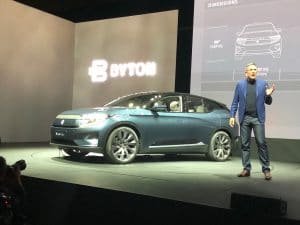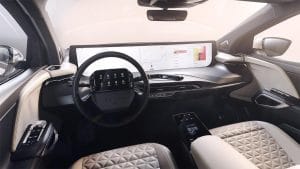
Byton CEO Dennis Kirchert said earlier the Chinese EV maker will sell its M-Byte SUV in China first, then move to the U.S. Now operation are suspended.
Once-promising battery-car start-up Byton is suspending operations for the next six months, but the prospects for the company then being able to get back to business seem slim, according to sources both inside and outside the company.
Best known for the 48-inch video display topping the instrument panel of its M-Byte SUV, Byton seemed poised for success as recently as last winter, the company showing off a production version of the electric ute at the 2020 Consumer Electronics Show in Las Vegas. Byton had completed its assembly plant in China and even won the coveted license from government regulators needed to go into production. But then the coronavirus pandemic struck and, as the Chinese market was forced into lockdown, things turned south.
In April, the automaker confirmed it would furlough about half of the 450 employees at its U.S. operations. Now, virtually all staff around the world will be let go, spokesman Dave Buchko told TheDetroitBureau.com Monday afternoon.
(Byton sets the stage for its European debut.)
“The company is going to suspend operations on July 1 for six months,” said Buchko, adding, “the board of directors and top management are looking to find a way to move the company forward.”

The M-Byte uses a 48-inch touchscreen to control several functions. The company had a deal with Viacomm for content on the screen.
Byton was founded in 2017 by a group of former BMW and Nissan executives ultimately backed by more than $800 million, most of it raised through China. The company was looking to build two all-electric models, starting with the M-Byte. At a time when an assortment of manufacturers are bringing battery-electric vehicles to market, the Byton signature feature was its 48-inch videoscreen instrument panel.
The company intended to use it not just to provide information to the driver but to serve as a source of entertainment seamlessly weaving into the rest of an owner’s digital life, Chief Customer Officer Andreas Schaaf said at CES last January. Among other things, Byton inked a deal with entertainment giant Viacomm to provide content for the vehicle.
“Cars are becoming more about data power than horsepower,” said Schaaf, during an hourlong presentation, and the M-Byte was meant to be “much more than a car that takes you from Point A to B. It is a smart device on wheels.”
(Byton reveals global production, sales plans fro M-Byte electric SUV.)
Byton is by no means the only EV start-up to run into trouble. Among the many competitors now struggling, Faraday Future had to abandon work on its original plant near Las Vegas. LeEco has effectively folded, as have other automotive wannabes.
But Byton had pushed further than most, getting its factory built and tooled up. It even produced a handful of vehicles needed to win approval to go into production. But with the global auto market in turmoil, it was unclear when it would actually be able to start moving metal to dealers and whether they’d be able to find the necessary customers.
“Without a revenue stream, we just hit the wall,” said Buchko.
Considering the operation is so close to production, it “may be” possible to pull off a Hail Mary deal, said Sam Abuelsamid, principal auto analyst with Navigant Research. “It’s possible a big Chinese company could come in with cash, like what happened with Nio,” another Chinese EV start-up that nearly folded this past spring. But, Abuelsamid quickly added, “I wouldn’t bet money on it.”
(Byton ready to put M-Byte EV – Complete with 48-inch video screen – into production.)
Neither, it seems, would some inside Byton, several, speaking on background, telling TheDetroitBureau.com that a reprieve seems unlikely. As one explained, there is a “narrow window” to get the M-Byte into production before a wave of competitors, including not only start-ups but established manufacturers like General Motors, Volkswagen and Ford start flooding the market with EVs of their own. By this time next year, analysts forecast, there will be dozens of new long-range offerings on global markets.

